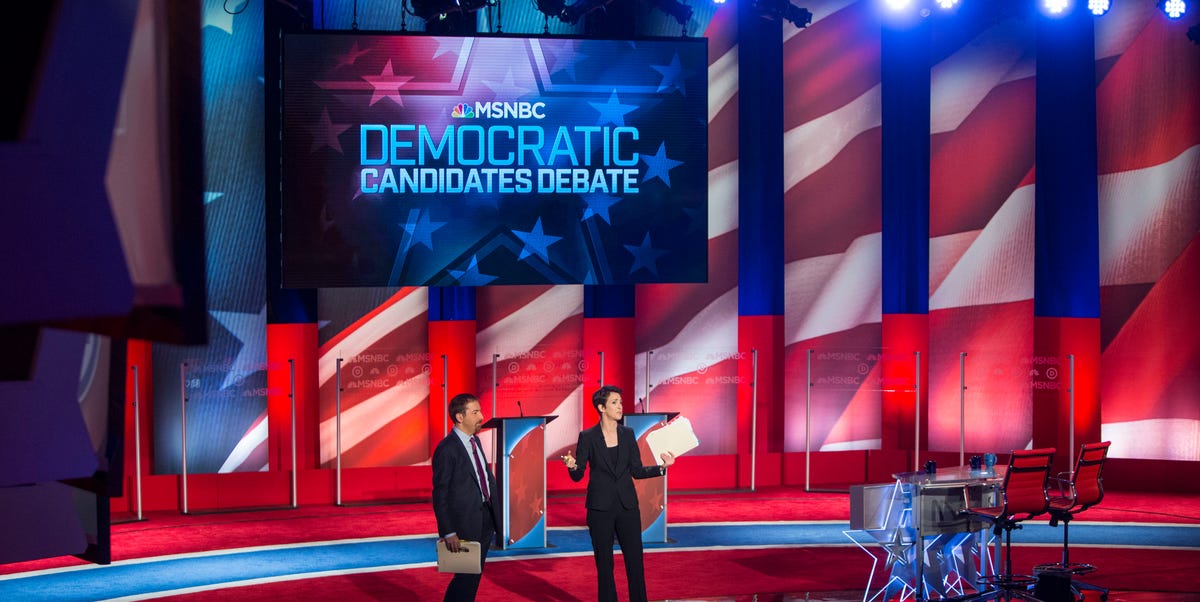The 2020 presidential race is in full swing, and there’s a mind-boggling number of Democratic primary candidates vying for the party’s official spot. Luckily for voters, the debates have officially begun. Here, everything you need to know.
When is the third debate?
The third debate will be hosted by ABC News in partnership with Univision on September 12 in Houston, Texas, from 8 to 11 P.M. The debate will take place at Texas Southern University, a public historically black university. The moderators will be George Stephanopoulos, David Muir, Linsey Davis, and Jorge Ramos.
NBC News reported that there will be a total of 12 debates during the Democratic primary season and that the first six are scheduled for 2019.
In case you missed it, the first Democratic primary debates took place on June 26 and June 27 in Miami, Florida. NBC News, MSNBC, and Telemundo hosted those debates, and the moderators were Savannah Guthrie, Lester Holt, Chuck Todd, Rachel Maddow and José Diaz-Balart. The second round of debates were hosted by CNN in Detroit on July 30 and 31, and the moderators were Dana Bash, Don Lemon, Jake Tapper.
The next, and fourth, debate will be October 15 and 16 in Ohio.
How can I watch it?
According to ABC, the third round of debates will be on ABC News Live, the ABCNews.com website and apps, as well as Hulu Live and Facebook Watch.
What will be the format?
During the Houston debate, candidates will have one minute and 15 seconds for direct responses to questions and 45 seconds for any rebuttals. There will be opening statements but no closing statements. According to ABC, the candidates’ placement on stage will be based on their polling averages; the highest polling candidates will stand toward the center.
Is everyone debating?
Definitely not. For the first and second round of debating, the Democratic National Committee announced that candidates had two paths to qualifying:
- “Register 1% or more support in three polls (which may be national polls, or polls in Iowa, New Hampshire, South Carolina, and/or Nevada) publicly released between January 1, 2019, and 14 days prior to the date of the Organization Debate.” (Read more about the specific polling restrictions here.)
- “Candidates may qualify for the debate by demonstrating that the campaign has received donations from at least (1) 65,000 unique donors; and (2) a minimum of 200 unique donors per state in at least 20 U.S. states.”
But after the first two debates, things get even trickier. To qualify for the third and fourth debates, which will take place in September and October, candidates will need to meet two requirements:
- 130,000 unique donors, with a minimum of 400 unique donors per state in at least 20 U.S. states
- Register at least 2% support in four qualifying polls released between June 28 and August 28.
So, who has qualified?
Candidates had until August 28 to reach the benchmarks set by the DNC for the third debate. Since only 10 candidates qualified, the debate will only occur on one night for the first time this election season.
FiveThirtyEight has officially reported the 10 candidates who qualified for the third round of debates. They include: Joe Biden, Cory Booker, Pete Buttigieg, Kamala Harris, Amy Klobuchar, Beto O’Rourke, Bernie Sanders, Elizabeth Warren, Julián Castro, and Andrew Yang.
Notable people who didn’t qualify, but you’ve seen on the debate stage before, include Tulsi Gabbard, Marianne Williamson, Michael Bennet, Steve Bullock, Bill de Blasio, John Delaney, and Tim Ryan.
What makes the September debate different?
This third debate is especially important considering it will be the first time all of the major 2020 candidates will appear on one debate stage at the same time. In the first two debates, top-polling candidates were often separated and voters were only able to see certain pairings go head-to-head (Sen. Harris and Joe Biden being the most notable, along with Sen. Warren and Sen. Sanders).
Thursday will be the first time Biden and Warren, two current front runners, will share a stage together, as well as the first time we’ll see Warren and Harris, the top-polling women, side by side.
Jennifer Holdsworth, the senior Democratic strategist at MWWPR, told ELLE.com that it will now become increasingly difficult for candidates who did not make this third debate to continue to make the case for their candidacies. “Though it is possible to have a viral moment offstage, it is now unlikely that another candidate will break through,” she explained. Holdsworth worked for Hillary Clinton’s presidential campaign in 2016 and served as Buttigieg’s national campaign manager when he ran for DNC chair in 2017; she’s publicly supporting Buttigieg in 2020.
As for what will happen on Thursday’s stage, Holdsworth believes Warren and Sanders will most likely confront Biden and push him on progressive policy prescriptions. She also emphasized the need for Harris, Booker, Klobuchar, Castro, and O’Rourke to solidify their message and have memorable performances in order to build the organization and fundraising operations they’ll need to sustain their campaigns to Iowa and New Hampshire.
ELLE.com will continue to update this post.
